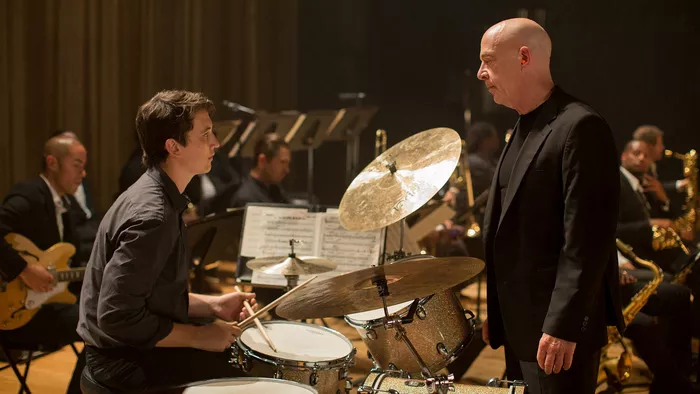I. Introduction: A Culmination of Themes
Whiplash, the 2014 drama directed by Damien Chazelle, has etched itself into the cinematic landscape with an ending that resonates with intensity and complexity. The culmination of the film’s central themes of resilience and the unwavering power of ambition is encapsulated in the final scenes. As the narrative unfolds, viewers are taken on a tumultuous journey alongside the protagonist, Andrew Neiman, portrayed by Miles Teller, who finds himself entangled in the relentless pursuit of greatness within the demanding world of jazz drumming.
II. The Thin Line Between Mentorship and Abuse: A Central Theme
At the heart of Whiplash’s conclusion lies a profound exploration of the delicate balance between mentorship and abuse. Terence Fletcher, portrayed with captivating intensity by J.K. Simmons, embodies the archetype of a demanding music instructor. His methods, however, transcend the conventional boundaries of mentorship, delving into the realm of psychological and emotional abuse. The ending crystallizes the blurred lines between fostering growth through rigorous guidance and the corrosive effects of a relationship that verges on toxicity. As the credits roll, viewers are left to grapple with the nuanced implications of Fletcher’s relentless pursuit of perfection on Andrew’s psyche and the broader implications for the pursuit of excellence in any field.
III. Pushing Boundaries for Success: The Uncomfortable Truth
Whiplash, in its concluding moments, serves as a stark reminder of the uncomfortable reality that success often demands pushing one’s boundaries to the absolute limit. Andrew Neiman’s journey, marked by physical and emotional challenges, becomes a microcosm of the sacrifices individuals may willingly make in the unrelenting pursuit of their dreams. The film prompts a critical examination of the price of success and whether the ends can ever truly justify the means. It leaves audiences questioning their own beliefs about ambition, inviting them to confront the uncomfortable truth that the path to greatness may involve navigating treacherous and ethically challenging terrain.
IV. A Fleeting Moment of Recognition: Damien Chazelle’s Perspective
Damien Chazelle, the visionary architect behind Whiplash, offers a unique perspective on the film’s conclusion. He sees the ending not as a triumphant culmination but as a fleeting moment of recognition. While Andrew achieves a momentary victory with his intense drumming performance, there’s an underlying darkness that casts a shadow over his supposed success. Chazelle’s perspective adds layers to the narrative, inviting viewers to consider the potential long-term consequences of Andrew’s relentless pursuit of perfection. The fleeting recognition he receives comes at a high cost, urging contemplation on the toll that the relentless pursuit of ambition can take on an individual’s well-being and the morality of those pushing them to the brink.
V. The High Cost of Greatness: A Thought-Provoking Finale
As the final scenes of Whiplash unfold, the lingering impact of the film’s ending prompts deep reflection on the high cost of greatness. The intense characters and emotionally charged narrative raise profound questions about the nature of success and the sacrifices necessary to achieve it. The haunting final moments challenge the audience to consider whether the pursuit of greatness is genuinely worth the toll it exacts on mental and emotional health. As Andrew’s hands bleed and the music reaches its crescendo, the palpable price of his ambition becomes a poignant metaphor for the sacrifices one might make in the relentless pursuit of excellence. Whiplash’s conclusion leaves an indelible impression, forcing viewers to grapple with the complexities of ambition, mentorship, and the pursuit of greatness in the face of potential personal sacrifice.
Conclusion: A Masterpiece of Ambiguity
In the final beats of Whiplash, the ambiguity of the ending stands as a testament to the film’s brilliance in storytelling. The unresolved tension between achievement and personal cost continues to resonate, inviting viewers to grapple with the complexities of ambition, mentorship, and the pursuit of greatness. As the drumsticks fall and the echoes of the final performance fade away, Whiplash’s ending remains a masterpiece of ambiguity that encourages interpretation and introspection. Within the realm of cinematic brilliance, Whiplash’s conclusion stands as a landmark, leaving a lasting impact on those who have witnessed its tumultuous narrative. In the wake of the film’s conclusion, audiences are left with a cinematic experience that transcends the screen, prompting ongoing reflection on their own convictions about success and the relentless pursuit of excellence.

